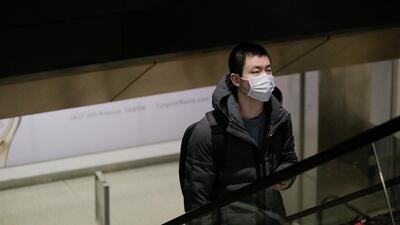A virus originating in China that has infected hundreds of people and killed 25 more is not yet a global health emergency, the World Health Organisation declared on Thursday.
But the UN health agency said the outbreak was an emergency within China, as the death toll rose by eight people early on Friday.
Chinese authorities locked down three cities on Thursday and cancelled major events in the capital, Beijing, during the Lunar New Year holiday period to try to contain the outbreak.
In Geneva, WHO Director General Tedros Adhanom Ghebreyesus said that while the outbreak was clearly an emergency in China, “it has not yet become a global health emergency. It may yet become one".
Mr Ghebreyesus said the decision should not be taken as a sign that the WHO "does not think the situation is serious or that we’re not taking it seriously".
"Nothing could be further from the truth. WHO is following this outbreak every minute of every day.”
The UN health agency made the decision after independent experts spent two days assessing information about the spread of the newly identified coronavirus.
“It’s too early to consider this as a public health emergency of international concern,” said Didier Houssin, the chair of the emergency advisory committee.
Mr Houssin said the panel “was very divided, almost 50-50".
WHO defines a global emergency as an “extraordinary event” that constitutes a risk to other countries and requires a co-ordinated international response.
Previous global emergencies have been declared for the Zika virus in the Americas, the swine flu pandemic and polio.
A declaration of a global emergency typically brings greater money and resources, but may also prompt nervous foreign governments to restrict travel and trade to affected countries, s the decision can be politically fraught.
In 2014, WHO resisted declaring the devastating Ebola epidemic in West Africa to be a global emergency because it feared the announcement would anger Guinea, Liberia and Sierra Leone.
Mr Houssin suggested that China’s view of the outbreak was a factor in Thursday’s decision.
“The perception of this declaration by the international community, in the most affected country, by the people struggling with the virus certainly has to be considered,” he said.
Meanwhile, a Saudi Health Ministry affiliate said on Thursday that there was no case of coronavirus in the kingdom, denying earlier reports of an expatriate being infected.
Earlier, India's Minister of State for External Affairs said an Indian nurse at a hospital in south-western Saudi Arabia has been infected by the coronavirus and was being treated.
But the Saudi Centre for Disease Control and Prevention said in a tweet that there were no cases of the coronavirus so far.
The kingdom said on Wednesday it would start screening passengers arriving from China and take other preventive measures after the outbreak in the central Chinese city of Wuhan in December.
The virus, which can pass from person to person, has since been reported in Thailand, Japan, South Korea and the US, raising concerns about its spread through international air travel.
More than 830 people have been infected, mostly in China.
Airports in many major cities globally have started health screenings for arriving passengers from China.
“For the moment, WHO does not recommend any broader restrictions on travel or trade,” Mr Ghebreyesus said

